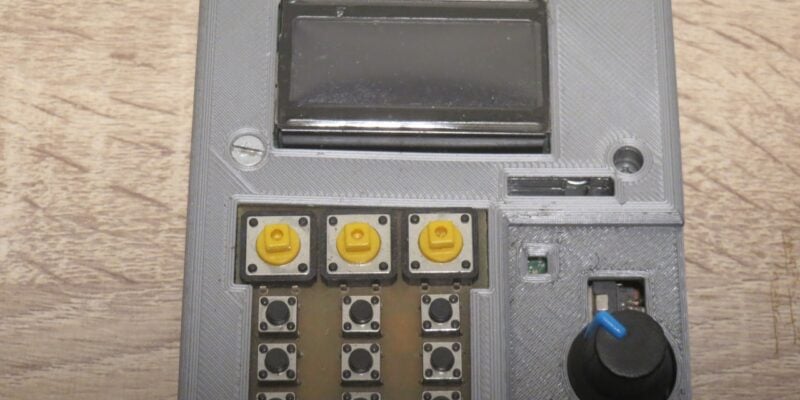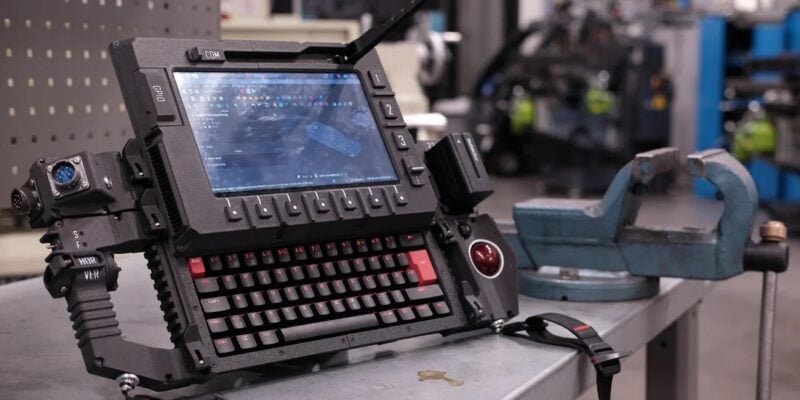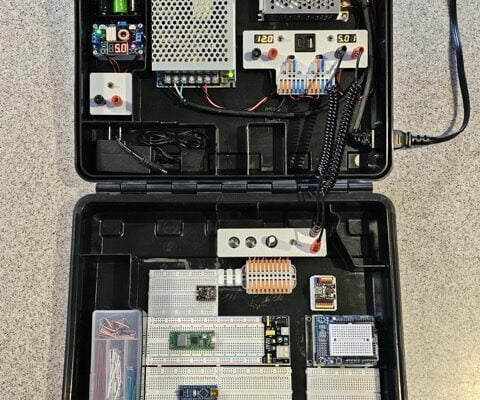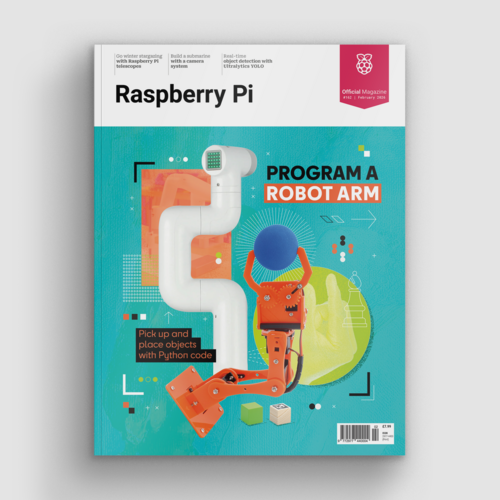Backpack Cyberdeck
By Rosie Hattersley. Posted

Like many readers of The MagPi, an early fascination with computers led maker Davide Marchetti to teach himself as much as he could about programming and electronics. His fascination with tech was enhanced through hands-on projects such as creating a hydroponic greenhouse system and building an Arduino-controlled pantograph.
Davide recently embarked on projects covering 3D printing and wireless communications, leading him to explore the wonderful possibilities of Raspberry Pi. The Backpack Cyberdeck is a self-contained, Raspberry Pi 4-powered, portable lab he can take anywhere with him on his bike. “Even when I travel, I want all my stuff with me for all occasions and always ready,” he says. It is housed in a fantastic plywood and 3D-printed frame, which is both lightweight and keeps everything securely in place.
Program a robot arm, with Raspberry Pi and Python code
A great framework
The Backpack Cyberdeck was inspired by Davide’s need to move his experiments easily without setup breakdowns – he works in the metalworking industry, and reasoned that a custom-designed frame that fits inside a commercially available backpack would come in mighty useful for other people as well as himself. He says the idea is that hobbyists and professionals can carry, use and interact with a variety of devices on the go. Raspberry Pi 4 was chosen for its compactness and power efficiency and serves as the ‘brain’ of Davide’s mobile setup. It allows him to remotely control devices mounted on the frame. The project runs on open-source software – “primarily GNU Radio for wireless communications analysis, and Kali Linux tools for security and penetration testing tasks”. He says the build cost was “moderate, reflecting the price of the Raspberry Pi, the backpack, and some additional electronic components like the RTL-SDR”.

Sharing the build photos on Facebook, Davide explains that it transforms a simple backpack into a customisable platform, allowing for the creation of mobile workstations, entertainment systems, or unique projects through 3D-printed attachments”. The Backpack Cyberdeck avoids the risk of damage or subsequent discomfort because there is no desk outdoors. Having cycled to his destination he can conduct his outdoor experiments “the most comfortable way”.
Bag your own
For Davide, one advantage of using Raspberry Pi is its compact size, which allowed him to design a system that was both powerful and practical. The design is entirely original, with all parts created or modified by him to suit his project’s requirements.

Interest in the backpack led Davide to set up Bag Builds as an online custom bag business, but he designed the Backpack Cyberdeck’s frame for DIY enthusiasts with a passion for 3D printing. He shares STL files for several versions of the Backpack Cyberdeck on his GitHub page, with customisation options for the hardware components all designed to fit neatly into a standard backpack. There is plenty of opportunity for DIY builds to be customised, since some users may need holes to allow antennae through, and to fit cables.
Reassuring curious but impressed project followers, Davide says all the components meet flight-safe guidelines for power output, so it could potentially be taken on board aircraft too. Davide is at pains to point out that everything he’s done with the Backpack Cyberdeck is legal and poses no security issues. He has posted several assembly videos on YouTube that show the breadth of uses for his backpacks, including using one as a mobile radio station.

“The idea could be adapted for various other purposes, such as mobile video streaming, electronic repair setups, or even as a simple organiser,” he says. “My advice to anyone interested in similar projects is to start small, and to pay attention to the interference that the various devices and cables could generate, compromising the functionality of some parts.”
Subscribe to Raspberry Pi Official Magazine
Save up to 37% off the cover price and get a FREE Raspberry Pi Pico 2 W with a subscription to Raspberry Pi Official Magazine.
More articles

Kuensa portable music sequencer
We like the look of where this device is going.
Read more →

Cyberdeck
We can’t imagine the looks you’d get using this machine on your daily commute, but apparently the maker of this wonderful machine does just that.
Read more →

Programming station
Spot the microcontroller: we can see an Arduino Uno, Arduino Nano, a pair of ESP32 boards, and a Raspberry Pi Pico, all waiting to be played with.
Read more →

